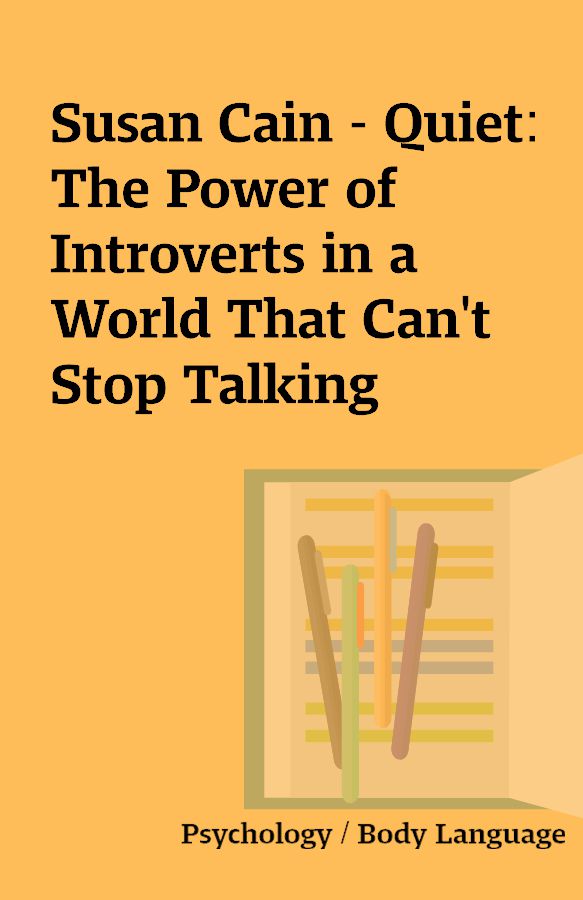Susan Cain – Quiet: The Power of Introverts in a World That Can’t Stop Talking
Quiet The Power of Introverts in a World that Can’t Stop Talking
[1 CD – 9 MP3s]
Description
How many introverts do you know? The real answer will probably surprise you. In our culture, which emphasizes group work from elementary school through the business world, everything seems geared toward extroverts.Luckily, introverts everywhere have a new spokesperson: Susan Cain, a self-proclaimed introvert who’s taken it upon herself to better understand the place of introverts in culture and society. With Quiet: The Power of Introverts in a World That Can’t Stop Talking, Cain explores introversion through psychological research old and new, personal experiences, and even brain chemistry, in an engaging and highly-readable fashion. By delving into introversion, Cain also seeks to find ways for introverts and extroverts to better understand one another–and for introverts to understand their own contradictions, such as the ability to act like extroverts in certain situations. Highly accessible and uplifting for any introvert–and any extrovert who knows an introvert (and over one-third of us are introverts)–Quiet has the potential to revolutionize the “extrovert ideal.” –Malissa Kent Amazon Exclusive: Q & A with Author Susan Cain Q: Why did you write the book?A: For the same reason that Betty Friedan published The Feminine Mystique in 1963. Introverts are to extroverts what women were to men at that time–second-class citizens with gigantic amounts of untapped talent. Our schools, workplaces, and religious institutions are designed for extroverts, and many introverts believe that there is something wrong with them and that they should try to “pass” as extroverts. The bias against introversion leads to a colossal waste of talent, energy, and, ultimately, happiness.Q: What personal significance does the subject have for you?A: When I was in my twenties, I started practicing corporate law on Wall Street. At first I thought I was taking on an enormous challenge, because in my mind, the successful lawyer was comfortable in the spotlight, whereas I was introverted and occasionally shy. But I soon realized that my nature had a lot of advantages: I was good at building loyal alliances, one-on-one, behind the scenes; I could close my door, concentrate, and get the work done well; and like many introverts, I tended to ask a lot of questions and listen intently to the answers, which is an invaluable tool in negotiation. I started to realize that there’s a lot more going on here than the cultural stereotype of the introvert-as-unfortunate would have you believe. I had to know more, so I spent the past five years researching the powers of introversion.Q: Was there ever a time when American society valued introverts more highly?A: In the nation’s earlier years it was easier for introverts to earn respect. America once embodied what the cultural historian Warren Susman called a “Culture of Character,” which valued inner strength, integrity, and the good deeds you performed when no one was looking. You could cut an impressive figure by being quiet, reserved, and dignified. Abraham Lincoln was revered as a man who did not “offend by superiority,” as Emerson put it.Q: You discuss how we can better embrace introverts in the workplace. Can you explain? A: Introverts thrive in environments that are not overstimulating—surroundings in which they can think (deeply) before they speak. This has many implications. Here are two to consider: (1) Introverts perform best in quiet, private workspaces—but unfortunately we’re trending in precisely the opposite direction, toward open-plan offices. (2) If you want to get the best of all your employees’ brains, don’t simply throw them into a meeting and assume you’re hearing everyone’s ideas. You’re not; you’re hearing from the most vocally assertive people. Ask people to put their ideas in writing before the meeting, and make sure you give everyone time to speak.Q: Quiet offers some terrific insights for the parents of introverted children. What environment do introverted kids need in order to thrive, whether it’s at home or at school? A: The best thing parents and teachers can do for introverted kids is to treasure them for who they are, and encourage their passions. This means: (1) Giving them the space they need. If they need to recharge alone in their room after school instead of plunging into extracurricular activities, that’s okay. (2) Letting them master new skills at their own pace. If they’re not learning to swim in group settings, for example, teach them privately. (3) Not calling them “shy”–they’ll believe the label and experience their nervousness as a fixed trait rather than an emotion they can learn to control.Q: What are the advantages to being an introvert?A: There are too many to list in this short space, but here are two seemingly contradictory qualities that benefit introverts: introverts like to be alone–and introverts enjoy being cooperative. Studies suggest that many of the most creative people are introverts, and this is partly because of their capacity for quiet. Introverts are careful, reflective thinkers who can tolerate the solitude that idea-generation requires. On the other hand, implementing good ideas requires cooperation, and introverts are more likely to prefer cooperative environments, while extroverts favor competitive ones.Review”An intriguing and potentially life-altering examination of the human psyche that is sure to benefit both introverts and extroverts alike.”–Kirkus, Starred Review”Cain gives excellent portraits of a number of introverts and shatters misconceptions. Cain consistently holds the reader’s interest by presenting individual profiles, looking at places dominated by extroverts (Harvard Business School) and introverts (a West Coast retreat center), and reporting on the latest studies. Her diligence, research, and passion for this important topic has richly paid off.”–Publishers Weekly”This book is a pleasure to read and will make introverts and extroverts alike think twice about the best ways to be themselves and interact with differing personality types.”–Library Journal”An intelligent and often surprising look at what makes us who we are.”–Booklist”In this well-written, unusually thoughtful book, Cain encourages solitude seekers to see themselves anew: not as wallflowers but as powerful forces to be reckoned with.”–Whole Living”Those who value a quiet, reflective life will feel a burden lifting from their shoulders as they read Susan Cain’s eloquent and well documented paean to introversion–and will no longer feel guilty or inferior for having made the better choice!”–MIHALY CSIKSZENTMIHALYI, author of Flow and Distinguished Professor of Psychology and Management, Claremont Graduate University”Superbly researched, deeply insightful, and a fascinating read, Quiet is an indispensable resource for anyone who wants to understand the gifts of the introverted half of the population.”–GRETCHEN RUBIN, author of The Happiness Project”Quiet is a book of liberation from old ideas about the value of introverts. Cain’s intelligence, respect for research, and vibrant prose put Quiet in an elite class with the best books from Malcolm Gladwell, Daniel Pink, and other masters of psychological non-fiction.”–TERESA AMABILE, Professor, Harvard Business School, and coauthor, The Progress Principle”As an introvert often called upon to behave like an extrovert, I found the information in this book revealing and helpful. Drawing on neuroscientific research and many case reports, Susan Cain explains the advantages and potentials of introversion and of being quiet in a noisy world.”–ANDREW WEIL, author of Healthy Aging and Spontaneous Happiness”Susan Cain has done a superb job of sifting through decades of complex research on introversion, extroversion, and sensitivity–this book will be a boon for the many highly sensitive people who are also introverts.”–ELAINE ARON, author of The Highly Sensitive Person”Quiet legitimizes and even celebrates the ‘niche’ that represents half the people in the world.”–GUY KAWASAKI, author of Enchantment: The Art of Changing Hearts, Minds, and Actions”Susan Cain is the definer of a new and valuable paradigm. In this moving and original argument, she makes the case that we are losing immense reserves of talent and vision because of our culture’s overvaluation of extroversion. A startling, important, and readable page-turner that will make quiet people see themselves in a whole new light.” –NAOMI WOLF, author of The Beauty Myth”Superb…A compelling reflection on how the Extrovert Ideal shapes our lives and why this is deeply unsettling. Based on meticulous research, it will open up a new and different conversation on how the personal is political and how we need to empower the legions of people who are disposed to be quiet, reflective, and sensitive.”–BRIAN R. LITTLE, PH.D., Distinguished Scholar, Department of Social and Developmental Psychology, Cambridge University “Quiet elevates the conversation about introverts in our outwardly-oriented society to new heights. I think that many introverts will discover that, even though they didn’t know it, they have been waiting for this book all their lives.”–ADAM S. MCHUGH, author of Introverts in the Church”Gentle is powerful… Solitude is socially productive… These important counter-intuitive ideas are among the many reasons to take Quiet to a quiet corner and absorb its brilliant, thought-provoking message.” –ROSABETH MOSS KANTER, Harvard Business School professor, author of Confidence and SuperCorp”Memo to all you glad-handing, back-slapping, brainstorming masters of the universe out there: Stop networking and talking for a minute and read this book. In Quiet, Susan Cain does an eloquent and powerful job of extolling the virtues of the listeners and the thinkers–the reflective introverts of the world who appreciate that hard problems demand careful thought and who understand that it’s a good idea to know what you want to say before you open your mouth.”–BARRY SCHWARTZ, author of Practical Wisdom and The Paradox of Choice
You must be logged in to post a review.






Reviews
There are no reviews yet.